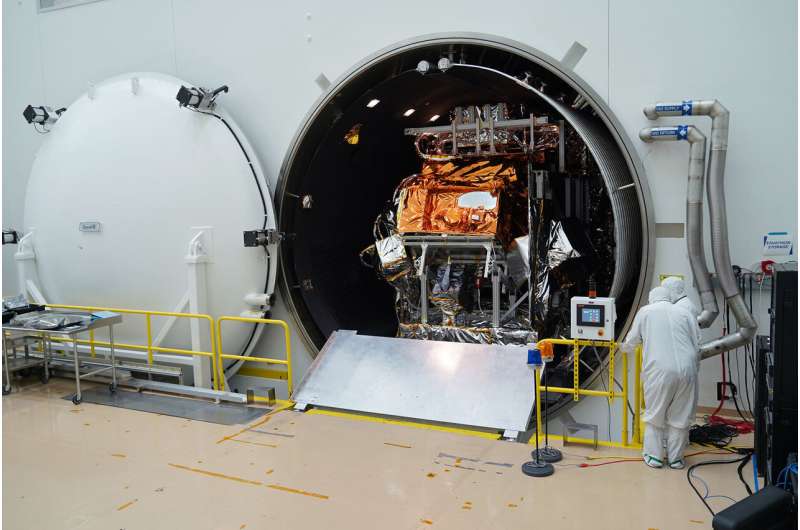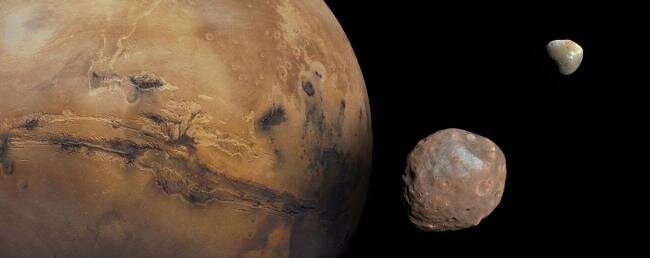
Copernical Team
Earth from Space: Glacier Bay, Alaska

Part of the Glacier Bay National Park and Preserve, which lies along the coast of southeast Alaska, is featured in this image captured by the Copernicus Sentinel-2 mission.
NASA completes critical testing milestone for NOAA's JPSS-2 satellite

The Joint Polar Satellite System-2 satellite, or JPSS-2, has cleared a critical testing milestone, bringing it a step closer to launch. Last week, the National Oceanic and Atmospheric Administration's polar-orbiting satellite emerged from the chamber after completing its thermal vacuum testing. This test is meant to show that the spacecraft and all of its instruments will perform successfully when exposed to the harsh environments of space.
"I can absolutely say with 100% certainty that the observatory is working great," said JPSS Flight Project Manager Andre Dress at NASA's Goddard Space Flight Center in Greenbelt, Maryland. "All the instruments are performing great, and we're going to meet all our requirements—and then some."
JPSS-2, the third satellite in the Joint Polar Satellite System series, will provide data that improves weather forecasts and advance our understanding of extreme weather and climate change.
Mars as a base for asteroid exploration and mining

Mining the asteroids for resources like iron, precious metals, water, or other valuable species may someday become profitable. Mining will probably starting with near Earth objects (NEOs), asteroids whose paths cross the Earth's orbital path.
Webb set to begin science operations
 NASA is scheduled to release the first images taken by the James Webb Space Telescope on July 12, 2022. They'll mark the beginning of the next era in astronomy as Webb - the largest space telescope ever built - begins collecting scientific data that will help answer questions about the earliest moments of the universe and allow astronomers to study exoplanets in greater detail than ever before.
NASA is scheduled to release the first images taken by the James Webb Space Telescope on July 12, 2022. They'll mark the beginning of the next era in astronomy as Webb - the largest space telescope ever built - begins collecting scientific data that will help answer questions about the earliest moments of the universe and allow astronomers to study exoplanets in greater detail than ever before. NASA's Chandra catches pulsar in X-ray speed trap
 A young pulsar is blazing through the Milky Way at a speed of over a million miles per hour. This stellar speedster, witnessed by NASA's Chandra X-ray Observatory, is one of the fastest objects of its kind ever seen. This result teaches astronomers more about how some of the bigger stars end their lives.
Pulsars are rapidly spinning neutron stars that are formed when some massive stars run
A young pulsar is blazing through the Milky Way at a speed of over a million miles per hour. This stellar speedster, witnessed by NASA's Chandra X-ray Observatory, is one of the fastest objects of its kind ever seen. This result teaches astronomers more about how some of the bigger stars end their lives.
Pulsars are rapidly spinning neutron stars that are formed when some massive stars run One step closer to understanding the Milky Way
 Unravelling the mysteries of the Milky Way and mapping it in the process is one of the main goals of the Gaia mission. On 13 June 2022, the mission came a step closer to achieving this with the publication of the complete third star catalogue.
Gaia observed and measured approximately 1.8 billion celestial objects for this purpose. By the expected end of the mission in 2025, the largest and
Unravelling the mysteries of the Milky Way and mapping it in the process is one of the main goals of the Gaia mission. On 13 June 2022, the mission came a step closer to achieving this with the publication of the complete third star catalogue.
Gaia observed and measured approximately 1.8 billion celestial objects for this purpose. By the expected end of the mission in 2025, the largest and To find a planet, look for the signatures of planet formation
 Finding forming planets is a tough but important job for astronomers: Only three planets have ever been discovered caught in the process of forming, and the most recent of these was found just weeks ago.
Evan Rich, a postdoctoral researcher at the University of Michigan, suggests that instead of looking for individual planets forming, astronomers might have better luck looking for the like
Finding forming planets is a tough but important job for astronomers: Only three planets have ever been discovered caught in the process of forming, and the most recent of these was found just weeks ago.
Evan Rich, a postdoctoral researcher at the University of Michigan, suggests that instead of looking for individual planets forming, astronomers might have better luck looking for the like Astronomers discover a multiplanet system nearby
 Astronomers at MIT and elsewhere have discovered a new multiplanet system within our galactic neighborhood that lies just 10 parsecs, or about 33 light-years, from Earth, making it one of the closest known multiplanet systems to our own.
At the heart of the system lies a small and cool M-dwarf star, named HD 260655, and astronomers have found that it hosts at least two terrestrial, Earth-s
Astronomers at MIT and elsewhere have discovered a new multiplanet system within our galactic neighborhood that lies just 10 parsecs, or about 33 light-years, from Earth, making it one of the closest known multiplanet systems to our own.
At the heart of the system lies a small and cool M-dwarf star, named HD 260655, and astronomers have found that it hosts at least two terrestrial, Earth-s Dead star caught ripping up planetary system
 A star's death throes have so violently disrupted its planetary system that the dead star left behind, called a white dwarf, is siphoning off debris from both the system's inner and outer reaches. This is the first time astronomers have observed a white dwarf star that is consuming both rocky-metallic and icy material, the ingredients of planets.
Archival data from NASA's Hubble Space Tele
A star's death throes have so violently disrupted its planetary system that the dead star left behind, called a white dwarf, is siphoning off debris from both the system's inner and outer reaches. This is the first time astronomers have observed a white dwarf star that is consuming both rocky-metallic and icy material, the ingredients of planets.
Archival data from NASA's Hubble Space Tele China says it detected alien signals using giant 'Sky Eye' telescope
 Scientists in China have announced that they've detected what may be signals from an alien civilization using the world's largest radio telescope, but warned they could be just radio interference.
Science and Technology Daily, the official newspaper of China's Ministry of Science and Technology, reported Tuesday that the team of scientists from Beijing Normal University identified two g
Scientists in China have announced that they've detected what may be signals from an alien civilization using the world's largest radio telescope, but warned they could be just radio interference.
Science and Technology Daily, the official newspaper of China's Ministry of Science and Technology, reported Tuesday that the team of scientists from Beijing Normal University identified two g 



































